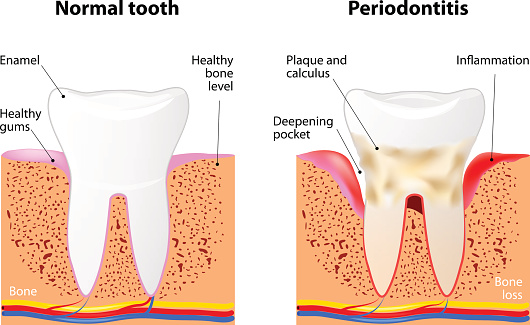|
Periodontics
|
Keeping your teeth in good condition is an important part of maintaining your overall health. When you fail to do this, you are opening up the door to a whole host of health issues that could require you to undergo rigorous and costly treatment plans. One of the worst things that can happen if you let your oral health fall by the wayside is the development of gum disease. This chronic condition can be incredibly devastating to both the form and function of your mouth, which means that it could affect the way you look as well as the way you feel, speak, eat, and swallow. At Excellent Dental Specialists, we can help diagnose and treat gum disease in order to keep your teeth as healthy as possible.
Gum disease is a condition that can develop when the bacteria in our mouths is not cleaned properly. The first stages of gum disease are often known as gingivitis. These particular stages are easily treatable as long as you visit our office routinely, and can usually even be reversed with proper treatment and care. Are you wondering what symptoms might help alert you to the presence of gingivitis? Let’s take a look!
The first thing that you might notice if you are suffering from gingivitis is that your gums are inflamed and bleed easily. They feel swollen, in other words, and you often see blood on your toothbrush or in the sink after brushing and flossing your teeth. Again, this kind of gum disease is usually reversible if you see a dentist and submit to routine treatment.
 The next stages in gum disease are known as periodontitis, and they are the most serious stages of the disease. If gingivitis is not treated, it can turn into periodontitis, where your gums will pull away from your teeth and form areas that develop infection. As this infection grows beneath the gums of your teeth, your body’s immune system will attempt to fight the bacteria. This can lead to a loss of gum tissue as well as bone. Eventually, your teeth could become loose and need to be removed due to the damaging effects of gum disease.
The next stages in gum disease are known as periodontitis, and they are the most serious stages of the disease. If gingivitis is not treated, it can turn into periodontitis, where your gums will pull away from your teeth and form areas that develop infection. As this infection grows beneath the gums of your teeth, your body’s immune system will attempt to fight the bacteria. This can lead to a loss of gum tissue as well as bone. Eventually, your teeth could become loose and need to be removed due to the damaging effects of gum disease.
Gum disease develops when bacteria and detritus in your mouth form plaque that is not removed by brushing or flossing. It turns into tartar, which must be removed by a dental professional. Should you fail to have this tartar removed, then you might end up with gingivitis, the first stages of gum disease, due to the irritating presence of tartar harming your gums.
There are some health factors that may put you at risk for gum disease. They include the following:
| • | Diabetes |
| • | Smoking |
| • | Medication Use |
| • | Hormonal Changes |
| • | Certain Illnesses and Treatments |
| • | Genetics |
As you can see, there are a variety of risk factors that could play a role in the development of gum disease. The best option is to keep an eye on your teeth and visit us regularly! Contact us to schedule a cleaning!